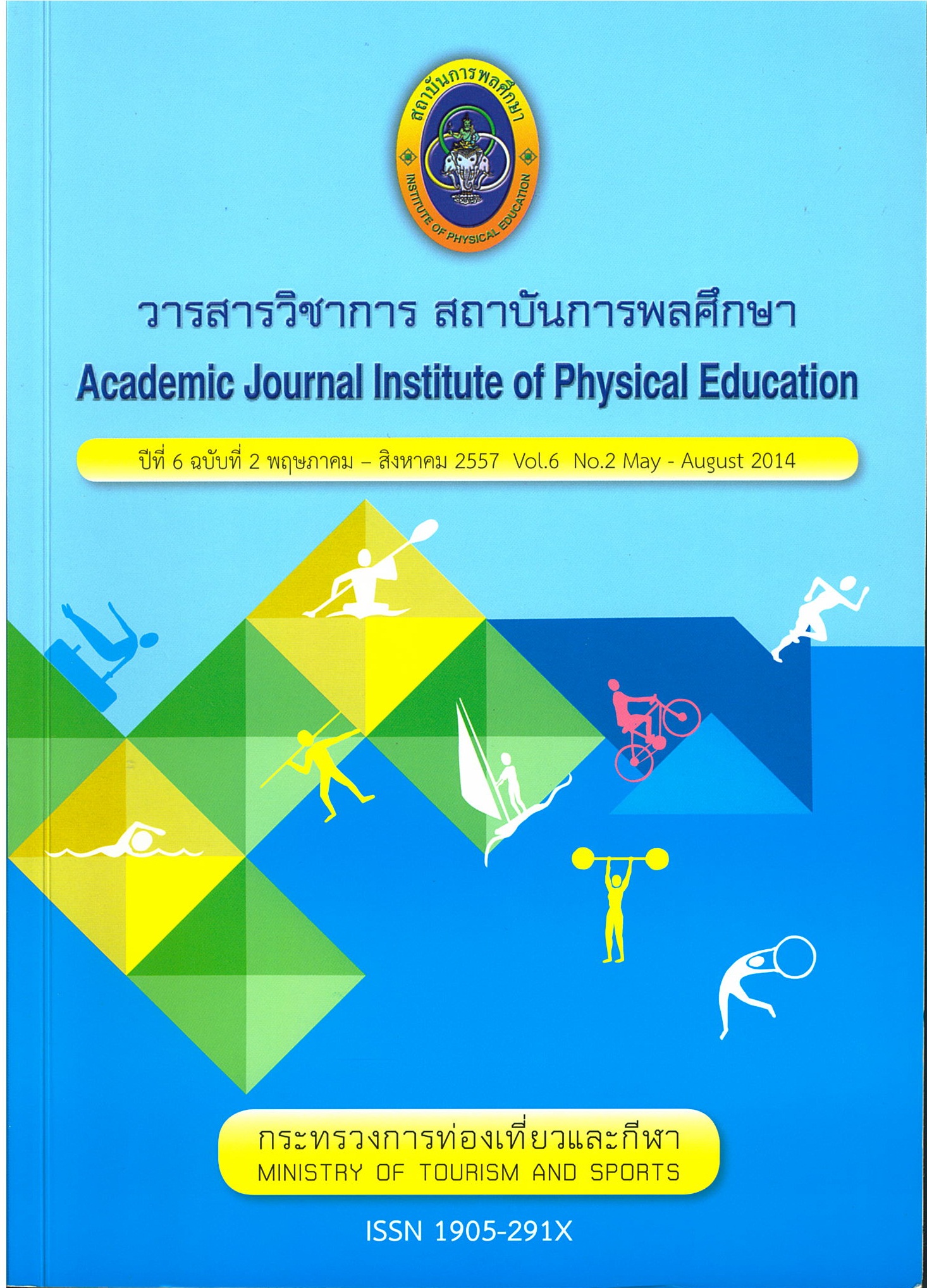oach Leadership and Athletes' Satisfaction Related to Athletes' Performing Behaviors and Game Results in the 27th National Youth Games
Main Article Content
Abstract
The purposes of this research were: (1) to study coach-leadership and athletes' satisfaction. (2) to propose coach-leadership and athletes' satisfaction related to athletes' performing behaviors and game results in the 27th National Youth Games. (3) to
establish the equations of the influences of coach-leadership and athletes' satisfaction affecting the athletes' performing behaviors and game results in the 27th National Youth Games. The mixed methodology was employed. The sample group for the quantitative research was 432 male and female soccer teams players, which selected by purposive sampling. The instrument for data collection was questionnaires on coach-leadership, athletes satisfaction, athletes' performing behaviors and game results. The statistics employed were frequency, percentage, arithmetic means, standard deviations, Pearson's Product Moment Correlation and Multiple Regression. In addition, the three athletes' team representatives, which 72 athletes were used for the qualitative research methods. Interviewing forms and observation forms were used to collect the data.
The results of the research were as follows: (1) the level of coach leadership and athletes' satisfaction overall was in the moderate level. (2) coach-leadership positive correlated to athletes' performing behaviors in 3 aspects as follows: coach-leadership in training and consultants, dictatorial leadership and democratic leadership. While, coachleadership correlated to game results in 4 aspects as follows: training and consultants, democratic leadership, community and group supporting, and positive results or rewarding. Both were statistically significant at 0.01. Athletes' satisfaction correlat game results in 6 aspects as follows: satisfaction in strategies, individual performances, training and consultants, team participation, community participation and budgeting. Also, Athletes' satisfaction correlated to athletes' performing behaviors in 7 aspects as follows: strategies, individual performances, training and consultants, team participation, community participation, ethics, and budgeting. Both were statistically significant at 0.01. (3) The Multiple Regression Analysis and creation of forecasting the equation of athletes' performing behaviors by coach- leadership in the 27th National Youth Games as shown in the following equation of standard score:
Ź = .726 (dictatorial leadership) +.095 (training and consultants).
It could be forecasting that the game results by coach-leadership in the 27th National Youth Games as shown in the following equation of standard score:
Î = .317 (training and consultants) – .235 (democratic leadership) + .215 (community and group supporting) + .191 (positive results or rewarding).
It could be forecasting that the athletes' performing behaviors by athletes' satisfaction in the 27th National Youth Games as shown in the following equation of
Z = .658 (ethics) + .152 (team participation) +.142 (individual performances).
It could be forecasting that the game results by athletes' satisfaction in the 27th National Youth Games as shown in the following equation of standard score:
= .393 (strategies) + .278 (training and consultants) + .311 (budgeting) + .088 (community participation).
The suggestion from this research were the youth soccer team coach should have leadership in many aspects such as give the training and consultants to athletes, train with democratic leadership which give the opportunity to the athletes to share the opinions for playing format, understand and support to the athletes within problems, give the admires and rewards to athletes. These coach leaderships will support the athletes' success in completions and also appropriated behaviors for the good athletes.
Article Details

This work is licensed under a Creative Commons Attribution-NonCommercial-NoDerivatives 4.0 International License.
The published article is a copyright of the Academic Journal of Thailand National Sports University. The passage appeared in each article in this academic journal is a perspective of each author which is not related to the journal. Each author is required to be responsible for all components of his/her own article. If there are any mistakes, each author must be responsible for those mistakes on his/her own.
References
ธวัช วีระศิริวัฒน์. (2538), หลักและการฝึกกีฬา, กรุงเทพฯ : ภาควิชาพลศึกษา คณะพลศึกษา สถาบันราชภัฏกําแพงเพชร.
นกุล โสตถิพันธ์. (2549). การพัฒนารูปแบบการฝึกอบรมผู้ฝึกสอนกีฬามหาวิทยาลัยแห่งประเทศไทยเพื่อปลูกฝังคุณลักษณะที่พึงประสงค์, วิทยานิพนธ์ปริญญาดุษฎีบัณฑิต กรุงเทพฯ : จุฬาลงกรณ์มหาวิทยาลัย.
นิลมณี ศรีบุญ. (2544). พฤติกรรมของผู้ฝึกสอนกีฬาที่มีผลต่อความสามัคคี ความพึงพอใจและความสัมพันธ์กับความสามารถของนักกีฬาในการแข่งขันกีฬาราชภัฏเกมส์ 1999. ดุษฎีนิพนธ์ กรุงเทพฯ : บัณฑิตวิทยาลัย มหาวิทยาลัยราชภัฏจันทรเกษม.
บุญมา กุลชาติ. (2550). ผลกระทบของภาวะผู้นําและจริยธรรมทางธุรกิจของผู้จัดการสาขาที่มีต่อผลการดําเนินงานของธนาคารเพื่อการเกษตรและสหกรณ์การเกษตร, วิทยานิพนธ์ การจัดการมหาบัณฑิต มหาวิทยาลัยมหาสารคาม.
ประโยค สุทธิสง่า. (2537). คู่มือการสอนฟุตบอล, กรุงเทพฯ : ไทยวัฒนาพานิช.
ประวิทย์ ไชยสาม. (2526), เทคนิคการฝึกฟุตบอล, กรุงเทพฯ : พุทธบูชาการพิมพ์.
วาสนา คุณอภิสิทธิ์. (2540), ความสําคัญและความเป็นมาของพลศึกษาและกีฬากับคุณภาพชีวิต. วารสารวิทยาศาสตร์การออกกําลังกายและการกีฬา, 1 (1), 1-6.
วิเชียร วิทยอุดม. (2548). ภาวะผู้นํา LEADERSHIP. กรุงเทพฯ : ธีระฟิลม์ และไซเท็กซ์.
ศิริวรรณ เสรีรัตน์ และคณะ. (2539) การบริหารการตลาดยุคใหม่. กรุงเทพฯ : พัฒนาศึกษา.
สุรางค์ โค้วตระกูล. (2552) จิตวิทยาการศึกษา. กรุงเทพฯ : จุฬาลงกรณ์มหาวิทยาลัย


